Input interpretation

malonaldehyde
Chemical names and formulas
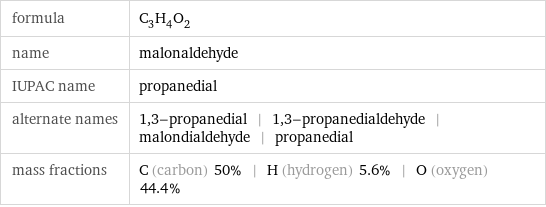
formula | C_3H_4O_2 name | malonaldehyde IUPAC name | propanedial alternate names | 1, 3-propanedial | 1, 3-propanedialdehyde | malondialdehyde | propanedial mass fractions | C (carbon) 50% | H (hydrogen) 5.6% | O (oxygen) 44.4%
Lewis structure
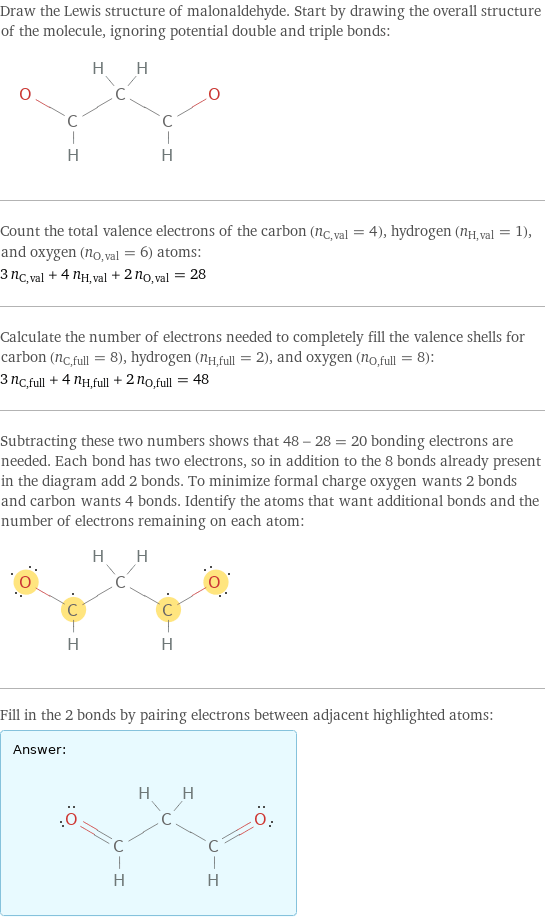
Draw the Lewis structure of malonaldehyde. Start by drawing the overall structure of the molecule, ignoring potential double and triple bonds: Count the total valence electrons of the carbon (n_C, val = 4), hydrogen (n_H, val = 1), and oxygen (n_O, val = 6) atoms: 3 n_C, val + 4 n_H, val + 2 n_O, val = 28 Calculate the number of electrons needed to completely fill the valence shells for carbon (n_C, full = 8), hydrogen (n_H, full = 2), and oxygen (n_O, full = 8): 3 n_C, full + 4 n_H, full + 2 n_O, full = 48 Subtracting these two numbers shows that 48 - 28 = 20 bonding electrons are needed. Each bond has two electrons, so in addition to the 8 bonds already present in the diagram add 2 bonds. To minimize formal charge oxygen wants 2 bonds and carbon wants 4 bonds. Identify the atoms that want additional bonds and the number of electrons remaining on each atom: Fill in the 2 bonds by pairing electrons between adjacent highlighted atoms: Answer: | |
3D structure
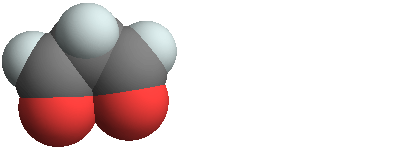
3D structure
Basic properties
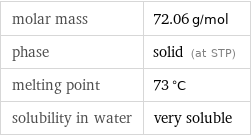
molar mass | 72.06 g/mol phase | solid (at STP) melting point | 73 °C solubility in water | very soluble
Units

Hydrophobicity and permeability properties

predicted LogP hydrophobicity | 0.1 predicted LogS | 0.52
Basic drug properties

approval status | experimental | small molecule
Thermodynamic properties

critical temperature | 592 K critical pressure | 5.5 MPa (at STP)
Chemical identifiers
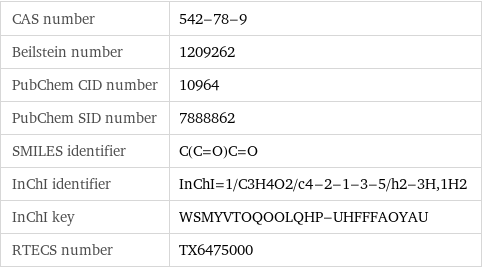
CAS number | 542-78-9 Beilstein number | 1209262 PubChem CID number | 10964 PubChem SID number | 7888862 SMILES identifier | C(C=O)C=O InChI identifier | InChI=1/C3H4O2/c4-2-1-3-5/h2-3H, 1H2 InChI key | WSMYVTOQOOLQHP-UHFFFAOYAU RTECS number | TX6475000
Toxicity properties

RTECS classes | tumorigen | mutagen